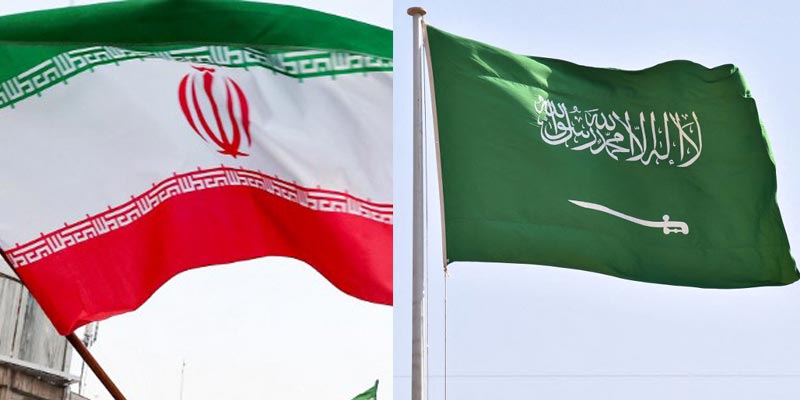- World
- Mar 11
Iran, Saudi Arabia agree to restore diplomatic ties
• Iran and Saudi Arabia agreed to re-establish diplomatic relations and reopen embassies after seven years of tensions.
• The deal, brokered by China, was announced on March 10 after four days of previously undisclosed talks in Beijing between top security officials from the two Middle East powers.
• The move caps a broader realignment and efforts to ease tensions in West Asia.
• The deal represents a major diplomatic victory for the Chinese. It also comes as diplomats have been trying to end a long war in Yemen, a conflict in which both Iran and Saudi Arabia are deeply entrenched.
• The joint statement calls for the reestablishing of ties and the reopening of embassies to happen within a maximum period of two months.
• China, which last month hosted Iran’s hard-line President Ebrahim Raisi, is also a top purchaser of Saudi oil. Xi visited Riyadh in December for meetings with oil-rich Gulf Arab nations crucial to China's energy supplies.
• Removing misunderstandings and the future-oriented views in relations between Tehran and Riyadh will definitely lead to improving regional stability and security, as well as increasing cooperation among Persian Gulf nations.
• Both sides stand to benefit from de-escalation, as Iran seeks to undercut US efforts to isolate it in the region and Saudi Arabia tries to focus on economic development.
• Fellow Gulf states the United Arab Emirates, Oman, Qatar, Bahrain and Kuwait welcomed restored Saudi-Iranian ties, as did Iraq, Egypt and Turkey.
What led to Iran-Saudi Arabia rivalry?
• Saudi Arabia cut ties with Iran in 2016 after its embassy in Tehran was stormed during a dispute between the two countries over Riyadh’s execution of a Shiite Muslim cleric.
• The execution came as Crown Prince Mohammed bin Salman, then a deputy, began his rise to power. The son of King Salman, Prince Mohammed at one point compared Iran’s Supreme Leader Ayatollah Ali Khamenei to Nazi Germany's Adolf Hitler, and also threatened to strike Iran.
• In the years since, tensions have risen dramatically across the Middle East since the US unilaterally withdrew from Iran’s nuclear deal with world powers in 2018.
• Iran has been blamed for a series of attacks in the time since, including one targeting the heart of Saudi Arabia’s oil industry in 2019, temporarily halving the kingdom's crude production.
• Though Yemen’s Iranian-backed Houthi rebels initially claimed the attack, Western nations and experts have blamed it on Tehran. Iran has denied launching the attack.
• The two powerhouses also have competing interests elsewhere, such as in the turmoil now tearing at Lebanon and in the rebuilding of Iraq after decades of war following the US-led 2003 invasion that toppled Saddam Hussein.
The conflict in Yemen
• The war between the government, supported by a Saudi-led military coalition, and the Iran-backed Houthi rebels has killed hundreds of thousands, displaced millions and pushed Yemen to the brink of famine.
• The Houthis seized Yemen’s capital, Sanaa, in September 2014 and forced the internationally recognised government into exile in Saudi Arabia. A Saudi-led coalition armed with US weaponry and intelligence entered the war on the side of Yemen’s exiled government in March 2015.
• A six-month ceasefire in Yemen’s war, the longest of the conflict, expired in October despite diplomatic efforts to renew it. That led to fears the war could again escalate. More than 150,000 people have been killed in Yemen during the fighting, including over 14,500 civilians.
• The US Navy and its allies have seized a number of weapons shipments recently they describe as coming from Iran heading to Yemen. Iran denies arming the Houthis, despite weapons seized mirroring others seen on the battlefield in the rebels’ hands. A United Nations arms embargo bars nations from sending weapons to the Houthis.
Iraq hosts several rounds of talks
• In recent months, negotiations have been ongoing, including in Oman, a longtime interlocutor between Iran and the US. Iran and Saudi Arabia have held off-and-on talks in recent years, but it wasn’t immediately clear if Yemen was the impetus for this new detente.
• Iraq, a neighbour to both countries, had hosted several rounds of talks between Iran and Saudi Arabia since April 2021. Those encounters were held at a relatively low level, involving security and intelligence officials.
• The Iraqi foreign ministry welcomed the deal and said previous mediation by Iraq had established a solid base for the later talks and agreement in China, which gave a qualitative impetus to cooperation for the countries of the region.
Manorama Yearbook app is now available on Google Play Store and iOS App Store

